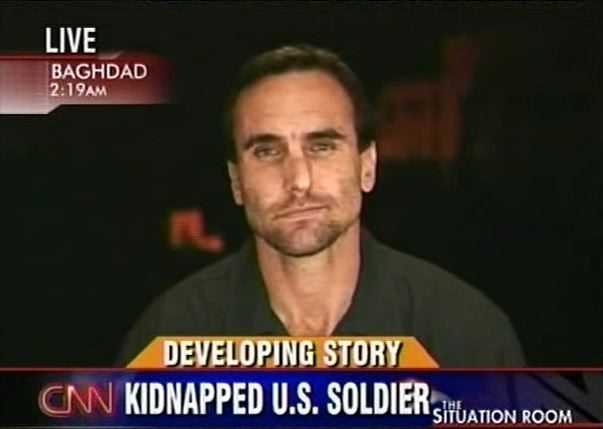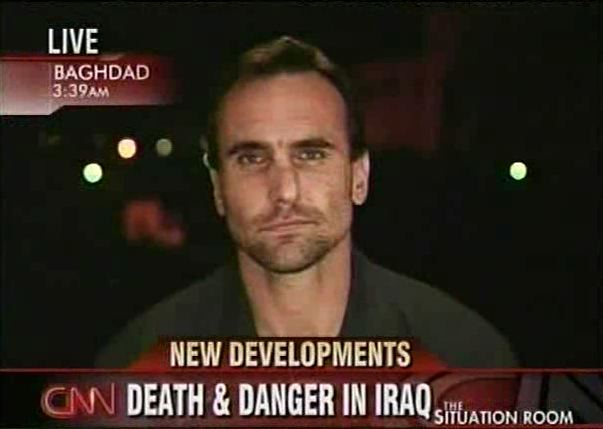TSR: More on Sadr City and the Mahdi Army

Click photo to play
Length: 3:40
WOLF BLITZER: We're learning important details about a kidnapped American soldier in Iraq. Right now officials are conducting an all-out search to try to find him. And today we also learned his name Ahmed Qusai al-Taie. He's 41 years old, a specialist in the U.S. Army Reserves. Officials showed a picture of him earlier today. Officials say the search includes both military and political activities.
CNN's Michael Ware is in Baghdad. He's joining Paula and me right now. Michael, what do we know? How is this search coming? Because we suspect it's been hampered somewhat by what the U.S. military is allowed and not allowed to do in and around that area called Sadr City.
MICHAEL WARE, CNN CORRESPONDENT: Well, very much so, Wolf. What we're seeing here is the intersection of politics and military operations here. And we're seeing a position where everyone is having to start declaring their hand, so to speak. We're seeing Muqtada al-Sadr protecting his power base and the prime minister, Nouri al-Maliki, though an American partner, still is under the great influence of Muqtada. So the military is trying to do things.
The most glaring example is seal off Sadr City, which they achieved for over a week following what they believe is the kidnap of this soldier. However, the prime minister, according to his press release, ordered them to lift those checkpoints or open ones which were already in place.
ZAHN: You have spent some time, with the Mahdi Army. What have you learned about their tactics, their strategy, their goals?
WARE: Well, what this is really about is politics and power. I mean this is about maneuvering for position. And the leader of the Mahdi Army, Muqtada al-Sadr, is in a key position to capitalize on what's going on right now. And that's what we're seeing being played out.
Now, the question is, who has this U.S. soldier? A senior U.S. officer I spoke to said they had strong intelligence that it was a Jaish al Mahdi, or Mahdi Army faction from within the Sadr bloc. Now the real issue is, is it mainstream or is this a rogue element? I mean we have seen this situation emerge here -- akin to the IRA, the Irish Republican Army, and the Real IRA; a much more militant wing that is disaffected with Muqtada because they don't believe he's militant enough.
BLITZER: Michael, as you take a look at the overall situation right now, give us the bottom line on this day, five days before the U.S. election. Does it look like the situation is improving a little bit or is it status quo or getting worse?
WARE: Well, Wolf, we have a U.S. soldier missing in whatever fashion. We see that the insurgent-- the Sunni insurgent war continues with attacks and U.S. casualties. We have seen the operation to secure Baghdad, a massive undertaking, which has stalled even by the military's own admission, not achieving the results. There's some temporary lulls in violence, but overall not affecting the dynamic. And all the while, Sadr City, this Mahdi Army stronghold, which American commanders made it very clear, that even with negotiation they intended to enter, still remains an almost no-go zone for U.S. forces except for lightning raids -- Wolf.
BLITZER: Michael Ware, thanks very much. Michael Ware reporting, Paula, for us from Baghdad. He's a very courageous journalist.
ZAHN: He is. He has spent a lot of time embedded with American troops as well. And we're very proud of the work that he files for us.

Click photo to play
Length: 5:38
WOLF BLITZER: More now on our top story in Iraq. A kidnapped American soldier is missing, and an all-out search for him continues. Today we learned his name as Ahmed Qusai al-Taie. An official showed a picture of him.
Might followers of a rogue militia be involved in this kidnapping? CNN's Michael Ware has more from Baghdad.
(BEGIN VIDEOTAPE)
MICHAEL WARE, CNN CORRESPONDENT (voice-over): Sadr City is a sprawling slum. An estimated 2.5 million people, almost half the population of Baghdad. Controlled not by the Iraqi government or the U.S. military, but by these men. They are the Mahdi Army, followers of this man, Muqtada al-Sadr, a powerful anti-American Shia cleric.
MUQTADA AL-SADR, SHIITE CLERIC (through translator): Who is going to protect Iraq? America protect Iraq? May God damn America.
WARE: His militia is a potent force. Brazen in this propaganda videos, vocal in this demonstration denouncing America, and discreet. Militiamen in civilian clothes at Sadr City checkpoints, searching for car bombs and Sunni insurgents.
U.S. military intelligence estimates the Mahdi Army has as many as 7,000 fighters. It credits the militia with at least 15 special forces companies, eight intelligence companies, religious courts that regularly order executions, and several punishment committees -- units acting both as internal investigators and anti-Sunni death squads.
And that's not all. Muqtada al-Sadr controls 30 seats in parliament, four government ministries, and wields considerable influence over Iraq's prime minister.
Opponents claim that has enabled the Mahdi Army to hold America's whole mission in Iraq hostage, politically and militarily, turning Sadr City into a virtually no-go zone for American soldiers.
So how did Muqtada al-Sadr become so powerful? To understand, for weeks, CNN has been visiting Sadr City, where the Mahdi Army's control is absolute. At a market, militiamen keep a watchful eye. And even women say they are ready to fight the Americans.
UNIDENTIFIED FEMALE (through translator): We will not accept our houses to be searched. The women will attack them. We have weapons and we will kill them!
WARE: Something the Mahdi Army has proven it is willing to do.
ABU MUHAMMED, MAHDI ARMY COMMANDER (through translator): Freedom should be taken, not given. So we will take it.
WARE: Abu Muhammed is a top Mahdi Army commander, who insisted his face not be shown.
MUHAMMED (through translator): Who is going to let himself negotiate in the name of this city and its people when Sayid Muqtada has not met a single American official all year.
WARE: No negotiation with the Americans. A popular position here. But while the Mahdi Army is formidable, it is not a monolith, with factions split as hard-liners push for even more attacks against U.S. forces.
On the street, unity, as the militia -- using Lebanon's Hezbollah as a model -- delivers services, overseeing government fuel ration cards at gas stations, security, even signing for the deaf at Friday prayers. And with the apparent capture of a U.S. soldier, another parallel to Hezbollah. One senior U.S. officer wonders if the kidnapping is an attempt to echo the capture of two Israelis that sparked July's war in Lebanon, an ominous suggestion, given how Muqtada and his loyalists are flexing their muscle in Sadr City and across Iraq.
(END VIDEOTAPE)
WARE: And part of that flexing the muscle of the Mahdi Army was the lifting of the blockade of Sadr City. Despite this, the American military spokesman in Iraq, Major General William Caldwell, vowed that the hunt for the missing U.S. soldier will continue, regardless. Nonetheless, he did concede that Muqtada al-Sadr, the leader of this militia, had to be accepted as part of the political process -- Wolf.
BLITZER: Michael, it's interesting you make this connection, this comparison with Hezbollah in Lebanon, because I've heard that from U.S. analysts back in Washington, as well.
But what is the relationship between this militia and Iran? We know the Iranians finance and support Hezbollah, but what about the Mahdi militia?
WARE: Well, the Mahdi militia, according to U.S. and British intelligence, is a major beneficiary of Iranian support in a whole manner of ways. Iran is essentially backing every horse in the race, so to speak, here in Iraq. And Muqtada's militia is one of them.
In particular, there's a point that U.S. military intelligence and the Mahdi Army intelligence officers both agree upon, and that is that some of these rogue elements, these more militant factions that are breaking away, are being picked up by Iran, funded and used, as U.S. intelligence officers say, as active operational units -- Wolf.
BLITZER: All right, Michael, thanks very much.
It's very disturbing, Paula, what's going on over there, because you do see parallels. Anyone who has been to Lebanon, as Michael has been, as I've been, you see parallels developing, very worrisome developments.
ZAHN: And it's pretty easy for all of us to understand why this war in Iraq is the number one issue on voters' minds as they head to the polls next week.
